




 |
   |
 |
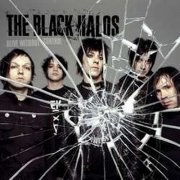 |
Alive Without Control (2005, 44.23) ***/T |
|
| Three Sheets to the Wind Last Call at the Toothless Saloon Alive Without Control Darkest Corners Mirrorman Studio Suffering Third World U.S.A. Tight |
Broken Exit Stagefright Burning Trash Unchanged I Need to Know |
|
Current availability:
Mellotron used:
The Black Halos hail from Vancouver and play punk bloody rock mate as it was, is and evermore shall be. Actually, they make a pretty decent noise, not entirely locked in the past, with real, unfettered energy, unlike absolutely anything that could be described as 'indie', however much they protest to the contrary. Alive Without Control is their third album and rocks along nicely, although Billy Hopeless (stop laughing)'s vocals do grate somewhat. Best track? Probably Broken, with its churning, high-energy riff, although nothing here's going to irritate the seasoned punk fan.
Jason Staczek plays occasional piano, Hammond and Mellotron, the latter on Tight, which opens with some very authentic-sounding solo cellos, before the track shifts into the band's usual gear. A lot of you aren't going to like this at all and I'm not sure how often I could listen to it, to be honest, but it does what it says on the tin and one decent Mellotron intro's a lot better than none. Incidentally, for the handful of you who haven't noticed, their label name is a joke that was old when the mighty Blackfoot used it in a lyric in, ooh, 1981 or so.
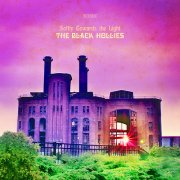 |
Softly Towards the Light (2009, 38.14) ***½/TT½ |
|
| Run With Me Run Gloomy Monday Morning When You're Not There Everything's Fine Number Ten Girl Lead Me to Your Fire Let Me Be the One Can't Stop These Tears (From Falling) |
How Did We Get Here Don't Be Afraid to Ask |
|
Current availability:
Mellotron used:
The cheekily-named Black Hollies wear their sole influence quite clearly on their velvet-jacketed sleeves: what Americans call the 'British Invasion'. Softly Towards the Light is an album of stunning unoriginality, although it's also an album of fun, good quality songs that do absolutely nothing to offend anyone who loves the just-pre-psych era as much as The Black Hollies. They're got all the right moves: Farfisa organ? Check. Yardbirds harmonies? Check. Corduroy caps? Check. There isn't a bad track on the album, but nor is there one you don't feel you've heard many times before, The Yardbirds' For Your Love obviously being a band touchstone. The most blatant steal is probably on Lead Me To Your Fire and then more for its lyrical reference to coming on down from the 13th floor (Roky who?) than any specific musical quirk.
Jon Gonnelli and Justin Morey both play Mellotron, a rare glitch in their homage, as few bands of the era hit it this hard, with a very real-sounding flute melody, complete with key-click, towards the end of opener Run With Me Run, string chords on Gloomy Monday Morning and How Did We Get Here and a faint flute line in Everything's Fine. As on so many records, it may be hidden away on another track or two, but it's rather hard to tell. So; fun but deeply unoriginal. And how, precisely, it that any different to most of the music from the last decade or two? The fun bit, chiefly.
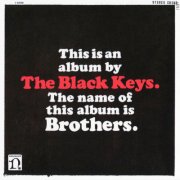 |
Brothers (2010, 55.28) ***½/TT |
|
| Everlasting Light Next Girl Tighten Up Howlin' for You She's Long Gone Black Mud The Only One Too Afraid to Love You |
Ten Cent Pistol Sinister Kid The Go Getter I'm Not the One Unknown Brother Never Gonna Give You Up These Days |
|
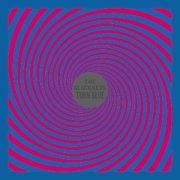 |
Turn Blue (2014, 45.08) ***/TT |
|
| Weight of Love In Time Turn Blue Fever Year in Review Bullet in the Brain It's Up to You Now Waiting on Words |
10 Lovers In Our Prime Gotta Get Away |
|
Current availability:
Mellotrons used:
I'll openly admit I've never heard The Black Keys before, the limit of my knowledge being that they're from Devo's hometown, Akron, Ohio and they're a bassless duo, à la The White Stripes, only without their image-consciousness and with a drummer (specifically, Patrick Carney) who can play, the other half of the partnership being guitarist Dan Auerbach.
Ignoring EPs and the previous year's Blakroc collaboration, 2010's Brothers is their seventh album proper, forged in the heat of a Brooklyn summer and at the legendary Muscle Shoals in Alabama. The duo are clearly exceedingly well-versed in all aspects of ye olde rock'n'roll, no two tracks of its fifteen sounding alike, while all fitting into an r'n'b/soul groove with a slight hip-hop edge to the vocals, with other influences dipping in and out as required. The most surprising of these is '70s glam rock, several tracks, not least opener Everlasting Light, sounding like dead-ringers for T. Rex. Auerbach refers in an online interview to having bought a Mellotron, transporting it to Muscle Shoals for the recording, utilising it on Next Girl, (faint choirs under sustained guitar), The Only One, I'm Not The One and Never Gonna Give You Up (strings), alongside the harpsichord they inadvertently persuaded their manager to locate. Anyway, despite sitting slightly outside my comfort zone, Brothers is good enough to transcend the usual barriers to acceptance, making for a most satisfying listen, merely enhanced by its Mellotron use. Worth hearing.
There's no Mellotronic involvement on 2011's El Camino, but it reappears on Turn Blue, three years later. The album does what The Black Keys do, essentially soulful rock'n'roll, at its best on opener Weight Of Love, which has something of the Neil Youngs about it, the electronica-influenced Fever (a hit, I believe) and Bullet In The Brain. Presumably Auerbach on presumably Mellotron, as I've heard more authentic-sounding use. Perhaps he sold that M400? Anyway, we get distant strings on Weight Of Love, a supporting flute melody on Fever, a string line on Year In Review and chordal strings on 10 Lovers and In Our Prime, but I wouldn't go too far out of your way for this, at least on the Mellotron front.
See: Dan Auerbach
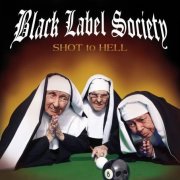 |
Shot to Hell (2006, 44.04) ***/TT |
|
| Concrete Jungle Black Mass Reverends Blacked Out World The Last Goodbye Give Yourself to Me Nothing's the Same Hell is High New Religion |
Sick of it All Faith is Blind Blood is Thicker Than Water Devil's Dime Lead Me to Your Door |
|
Current availability:
Mellotron used:
Zakk Wylde (that's Jeffrey Phillip Wielandt to you) got the gig with Ozzy Osbourne in the late '80s, although it's hardly what you'd call the most full-time post. As a result, Zakk has plenty of time to run his own outfit, Black Label Society, which seems to be as much a beer, barbecues and bike club as a band. Going by their seventh studio album, 2006's Shot to Hell, Zakk appreciates that sometimes you need to slow things down a bit, although the bulk of the album's made up of Ozzyesque metal with a bit of Sabbath thrown in for good measure. The first half of New Religion surprises, being a piano-and-orchestration instrumental before the guitars cut in, while Nothing's The Same and Sick Of It All pile on the piano and (relatively) sensitive vocals, but don't make the mistake of thinking Zakk's gone soft on us, er, so to speak.
I've seen both Wylde and producer Michael Beinhorn credited with playing the latter's M400 on the album, so I'm not sure which credit's more accurate. Quite possibly both. Anyway, someone plays flutes (and strings?) on Nothing's The Same, a flute intro on New Religion, flutes on Sick Of It All over the synth strings and another flute melody on closer Lead Me To Your Door, which is vastly more than I'd expected. Overall, then, a modern metal album with retro touches and some quiet bits laced with Mellotron. Does that sum this up sufficiently?
See: Samples etc. | Ozzy Osbourne
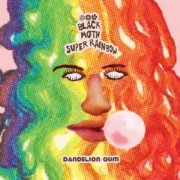 |
Dandelion Gum (2007, 46.42) ***/TTTT |
|
| Forever Heavy Jump Into My Mouth and Breathe the Stardust Melt Me Lollipopsichord They Live in the Meadow Sun Lips Rollerdisco Neon Syrup for the Cemetery Sisters The Afternoon Turns Pink |
When the Sun Grows on Your Tongue Spinning Cotton Candy in a Shack Made of Shingles Drippy Eye Lost, Picking Flowers in the Woods Caterpillar House Wall of Gum Untitled Roadside Demo Untitled |
|
Current availability:
Novatron used:
Black Moth Super Rainbow are usually referred to as a 'psychedelic' band, but their fourth album, 2007's Dandelion Gum, is more 'indie psychedelic electronica' than anything else, with programmed beats and (presumably real) analogue synths all over the place. Mostly instrumental, the album has its more acoustic moments, but those looking for a 'typical' psych outfit should probably look elsewhere.
There are uncredited Mellotron flutes on most tracks; interestingly, the band's Wikipedia entry mentions that they use a Novatron, so although it sounds too smooth to be genuine, it seems unlikely that anybody would bother going to that level of detail when they merely mean Mellotron samples. Anyway, particularly heavy use on Sun Lips, The Afternoon Turns Pink and When The Sun Grows On Your Tongue. My guess is that we're hearing phrases played on a real machine, then sampled and sequenced, as the repeats are too even for their own good. So; plenty of Mellotron, albeit only flutes, on an album that seems largely devoid of boring stuff like tunes. In fact, what little melody gets through is largely from the Mellotron... The band's frontman, Tobacco (hey! Good name!), has released a handful of solo albums, including one with Mellotron inclusions, assuming it isn't sampled.
See: Tobacco
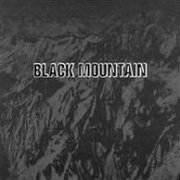 |
Black Mountain (2005, 46.31/88.47) ***½/T½ |
|
| Modern Music Don't Run Our Hearts Around Druganaut No Satisfaction Set Us Free No Hits Heart of Snow Faulty Times |
[Deluxe ed. adds: Druganaut (extended remix) Buffalo Swan Bicycle Man Behind the Fall Set Us Free (demo) Black Mountain (demo) No Satisfaction (UK radio) It Wasn't Arson] |
|
 |
In the Future (2008, 57.16/72.22) ****/TTTT |
|
| Stormy High Angels Tyrants Wucan Stay Free Queens Will Play Evil Ways Wild Wind |
Bright Lights Night Walks [Limited ed. adds: Bastards of Light Thirteen Walls Black Cat] |
|
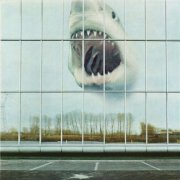 |
Wilderness Heart (2010, 42.49) ****/TTT½ |
|
| The Hair Song Old Fangs Radiant Hearts Rollercoaster Let Spirits Ride Buried By the Blues The Way to Gone Wilderness Heart |
The Space of Your Mind Sadie |
|
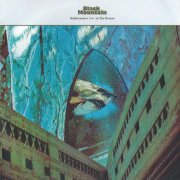 |
7"/CD-R (2011) ***½/TT½ Rollercoaster In the Drones |
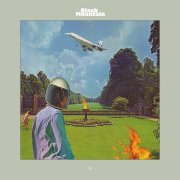 |
IV (2016, 56.15) ***/TT |
|
| Mothers of the Sun Florian Saucer Attack Defector You Can Dream Constellations Line Them All Up Cemetery Breeding (Over and Over) The Chain |
Crucify Me Space to Bakersfield [2-disc ed. adds: Mothers of the Sun (demo) Florian Saucer Attack (demo) Line Them All Up (demo) Cemetery Breeding (demo) Crucify Me (demo)] |
|
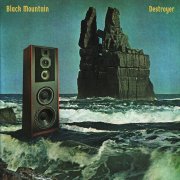 |
Destroyer (2019, 43.12) ****/T½Future ShadeHorns Arising Closer to the Edge High Rise Pretty Little Lazies Boogie Lover Licensed to Drive FD'72 |
Current availability:
Mellotrons used:
Black Mountain are a funny old mixture; usually described as 'psychedelic', on their eponymous 2005 debut, they actually mix early-'70s hard rock (notably on Don't Run Our Hearts Around) with various strains of late-'60s psych, including that weird 'folk collective' style (think: massed vocals from both genders, sometimes with a vaguely gospel feel), with hints of late-'70s Noo Yawk noo wave and modern indie, to mostly good effect. The band are known to own a real Mellotron (actually a Novatron), but for all their championing of it, there's not actually that much to be heard on Black Mountain, with background choirs on Set Us Free (as it kicks off) and a flute part on Heart Of Snow, probably from Jeremy Schmidt; the strings are either an old string synth or a modern emulation, by the sounds of it. 2015's deluxe edition adds an entire disc's-worth of extras, both good (Buffalo Swan) and not (the indie-ish Bicycle Man, the dreary demo of Black Mountain), so, with only distant Mellotron choirs on Buffalo Swan, I couldn't really recommend a re-purchase.
It took the band three years to follow up with In the Future, chucking out most of its predecessor's foibles in the process, making it a more straightforward and cohesive release. It's unlike me to praise a limiting of horizons, but it's actually a better record for being more focussed. They've seriously made up for their debut's failings on the Mellotron front (Schmidt again?) and how, with strings and choirs on opener Stormy High, nicely upfront string and flute melodies in Angels, strings, flutes and choirs on the epic Tyrants... Wucan's strings are certainly wobbly enough to be real, while Stay Free features the first appearance of a second tape frame and cellos, with more choirs on Queens Will Play and Wild Wind and a return to that second frame for the brass on the sixteen-minute Bright Lights. A limited edition version of the album adds rather good three tracks to a second disc, two from a limited-edition 12". Bastards Of Light features a Mellotron flute part, with more of the same, plus choirs, on Thirteen Walls.
2010's Wilderness Heart delves even further into the past for its inspiration, sounding like a more psychedelic Sabbath in places; the stupendously rocking Let Spirits Ride could almost be a Heaven & Hell outtake, while the seriously Zep-esque The Hair Song and Old Fangs help to keep the standard up. Nearly as much Mellotron as last time round, with semi-Arabic scale strings on The Hair Song, more strings on Old Fangs, something unidentifiable, yet clearly Mellotronic, on Rollercoaster, background choirs on Let Spirits Ride, another major string part on Buried By The Blues, strings and near-solo choirs on the title track with more of the same on closer Sadie to finish things off nicely. You wouldn't call Rollercoaster an immediately obvious single, but its flip, In The Drones, is at the gentler end of their range, with Mellotron flutes and chordal strings to pep it up.
2012's Year Zero soundtrack contains new and old material, but nothing new in the Mellotronic line. 2016's imaginatively-titled IV marks a semi-return to their early indie/psych days, not necessarily a move for the better, to be honest. Highlights include the old-school hard rock of Constellations, the psych-doom of (Over And Over) The Chain and trippy closer Space To Bakersfield, although opener Mothers Of The Sun, the punky Florian Saucer Attack and the drone-heavy Line Them All Up work less well. Schmidt's finally officially credited with (heavily reverbed throughout) Mellotron, with a flute line on Mothers Of The Sun, occasional choir notes on Constellations and Line Them All Up and flute and string lines on Cemetery Breeding, although the jury's out on whether or not that's a string note under the string synth on Space To Bakersfield. The two-disc edition adds less reverbed flutes on the Mothers Of The Sun demo, although the disc's other demos really are for die-hards only.
2019's Destroyer (yeah, yeah, Kiss fans, whatever) is actually a return to form, prime heavy psych pretty much throughout. Highlights? The ridiculously-titled Horns Arising, High Rise and Licensed To Drive, perhaps, although opener Future Shade is a little too close to Kiss' dumb-arse hard rock for comfort... And what's going on with closer FD'72's Bowie knock-off? Although Schmidt's credited with Mellotron on all but one track, it's only properly audible on three, with choirs halfway through Horns Arising and strings and chordal choirs all over Pretty Little Lazies, the album's obvious Mellotronic highlight, with more of the same, buried in the mix, on Boogie Lover. The other three credited tracks? Difficult to say, particularly the amusingly-titled Closer To The Edge, a laid-back, synth-heavy piece, where any Mellotron parts should cut straight through the mix. Anyway, a fine album, if light on audible Mellotron work. All in all, then, if you prefer waffly indie/psych with the odd hard rock interjection, go for Black Mountain's debut or IV, but if you're of a hairier persuasion, In the Future, Wilderness Heart and Destroyer are yer men.
See: Sinoia Caves
 |
Equinox (2016, 38.31) ***/T |
|
| When The Night is All I See Because it's There The Grain Gallop A Dirge Equinox Melee Thaw |
Rove Whirl Hunker |
|
Current availability:
Mellotron used:
Black Oak (who said Arkansas?) are a collaboration between The Black Atlantic's Geert van der Velde and I am Oak's Thijs Kuijken, whose mission on their debut, 2016's Equinox, seems to be to channel CSN&Y and other similar, acoustic-based acts from the early '70s, with variable results. The album works better on the more acoustic numbers; opener When The Night Is All I See, The Grain, Thaw and Rove, although nothing here jars too badly.
Matthijs Herder and Esther Postma play Matthijs' Mellotron, him on distant, ethereal choirs on Thaw and her on low-key strings on closer Hunker, but nothing obvious on Rove, despite a credit. A decent enough debut, then, although I've no idea whether or not the duo intend to work together again.
See: The Black Atlantic
Black Sabbath (UK) see: |
 |
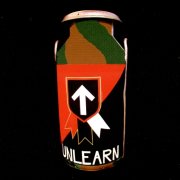 |
Kiss My Sweet Apocalypse (2009, 91.22) ***/TT½ErnestoProtest-Underground Che Underground Resistance Leila Khaled Kiss My Sweet Apocalypse |
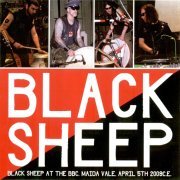 |
Black Sheep at the BBC (2009, 34.16) ***/½Bank of EnglandNot Happy Vachel Lindsay The Doorway Character |
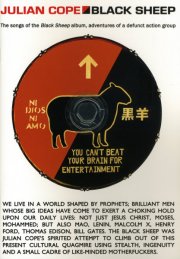 |
Cope's Notes #4: Black Sheep (2023, 44.52) ***/TTTMy Heathen RevolutionFree the Jews All the Blowing-Themselves-Up Motherfuckers Song for Mam Tor Cromwell in Ireland Mother, Where is My Father? The Everlasting No I Wanna Know What's in it for Me At Home He Feels Like a Tourist It's Too Late to Turn Back Dub The Death of Monotheism Preaching Revolution Radio Ad John Brown's Body Part One |
Current availability:
Mellotrons used:
Black Sheep are one of Julian Cope's multiple band projects, clearly based around the concept of resistance and revolution. Released in what appear to be two fairly different editions (CD and vinyl), 2009's double-CD Kiss My Sweet Apocalypse is, unsurprisingly, longer, the title track nearing half an hour. Musically, it both sounds like 'typical Cope' and not, lengthy jams intercut with chanted slogans and hand-thwacked bass drums. But are there any songs on it? I hear you cry. Er, not really, no, but then that isn't really what you buy Cope albums for, is it? Is it? Cope (credited, amusingly, as 'Julian H.') plays Mellotron M400 (credited as such) on four of the six tracks, with harsh flutes and deliberately wobbly strings on Ernesto, complete with probably the roughest Mellotron pitchbend I've ever heard committed to virtual tape, although I can't hear the credited Mellotron on the relatively short Che (sound effects?). Leila Khaled starts with a Mellotron string line, switching between strings, reedy choir and flute before leaving the song to its strummed acoustic and wind effects, while the title track has a flute melody near the beginning, then bugger-all until a clicky repeating string line near the end of the behemoth.
The band recorded a BBC session at that organisation's famed Maida Vale studios on April 5th of that year, released as Black Sheep at the BBC, delivering four revolutionary tracts (sic) over the course of thirty-five minutes, with varying levels of musical success. Near-quarter-hour opener Bank Of England sees the band chanting 'bankers' (or something very similar) for its first few minutes, massed drums, rudimentary piano and guitar feedback filling out the sonic tapestry, while Not Happy substitutes squalling synth for pretty much any other tuned instrumentation. Vachel Lindsay is a rough-hewn acoustic number, leaving the short, distorted synthscape of The Doorway Character (credited to Black Sheep Electronic Division) to finish things off. Cope adds Mellotron flute (?) chords to Vachel Lindsay, although that would appear to be your lot. Another day, another (two) Cope record(s), although these ones take a bit of a left turn, referencing the Black Panthers and (at least on the vinyl version of Kiss) the Baader-Meinhof Gang.
Long after the event, 2023's Cope's Notes #4: Black Sheep is one of a series of archival releases, although I've no idea from whence these tracks emanate. Most of it's typical Cope indie, neither here nor there, although At Home He Feels Like A Tourist clearly references The Gang of Four's similarly-named song, while The Death Of Monotheism could almost be Cardiacs in its key-change frenzy. Mellotron on most tracks, with string parts on opener My Heathen Revolution, Free The Jews, Song For Mam Tor, Cromwell In Ireland, Mother, Where Is My Father?, The Everlasting No and closer John Brown's Body Part One, although the set's Mellotronic highlight has to be It's Too Late To Turn Back Dub, with chordal strings and choirs and a flute line livening things up no end.
See: Julian Cope | Christophe F. | David Wrench
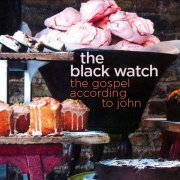 |
The Gospel According to John (2017, 36.48) **½/TWhenceWay Strange World The All-Right Side of Just OK A Story Jealously Orange Kicks Oscillating Redux Satellite |
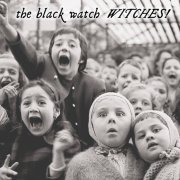 |
Witches! (2018, 39.19) **/½ |
|
| Dances for Sad Footsteps Slow When We First Met The Beginning of the End Legerdemain Graymalkin Comes Georgette, Georgette From Hampstead Heath The Weird Sisters |
Ode to Spring Nineteen Sixty Six or So |
|
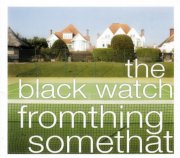 |
Fromthing Somethat (2020, 37.44) **½/T |
|
| Saint Fair Isle Sweater The Nothing That is The Lonesome Death of Mary Hansen Green Stars, Clouds Departing Drip, Drip, Drip All I Know (is That the Moon is Beautiful) Such Like Friendly Demons |
The Haves & Nots For Always Then to Keep I'm Not Hung Up |
|
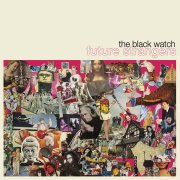 |
Future Strangers (2023, 37.24) **/T |
|
| We Know Nothing Nothing Left to Say The Neverland of Spoken Things Dani Wish I Had Something Future Strangers The Poison Flower Off You Go Redux! |
They May Be Grey In My Head Julie 3 |
|
Current availability:
Mellotrons used:
Rarely have a band more precisely defined the term 'indie rock' than The Black Watch, although it's difficult to ignore their psychedelic influences. Perhaps 'pure' indie needs a side salad of psych? Discuss. 2017's The Gospel According to John is something like their fifteenth album, probably at its best at its most psychedelic, namely on seven-minute closer Satellite. Robert Campanella plays his Mellotron, with occasional background flutes on The All-Right Side Of Just OK, background strings on A Story, only really audible at the end of the song and a faint flute line on Satellite. The following year's Witches! typifies everything that's bad about indie rock, which is a good bit, going by the evidence presented here. Lack of inspiration, lack of originality, lack of using more than two chords per song, lack of singing in tune, even when there is one, (deliberately?) shitty playing... The list goes on. When We First Met is a particularly bad example, the album being at its least irritating on The Weird Sisters, despite some dreadful lyrics. Campanella's Mellotron? A muted string line on When We First Met and a little flute run on From Hampstead Heath.
Their second album of 2020, Fromthing Somethat, (curiously, their first, Brilliant Failures, features Mellotron samples) is... yet another Black Watch album, basically. Better tracks? Green Stars, Clouds Departing's psych, the breezy The Haves & Nots and closer I'm Not Hung Up, also the sole recipient of Campanella's Mellotron, with a nice little flute part running through the song. '23's Future Strangers is the old saying 'if it ain't broke, don't fix it' writ large; sadly, unless you're a fan of their particular brand of lo-fi indie, it is broke, proving it across eleven tracks of deeply unimaginative indie schlock, at its least bad during the album's occasional bursts of psychedelic invention, notably the more energetic Off You Go Redux! Campanella on Mellotron, as usual, with a muted flute line on opener We Know Nothing and chordal flutes on Dani. The Black Watch? Just say no.
See: Samples etc.
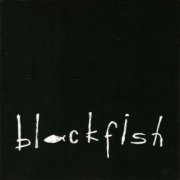 |
Blackfish (1993, 45.24) **½/0 |
|
| The Fall I Don't Care The Only One Easy as Saying Goodbye Turn Around If I Sweet Sixteen Down for the Count |
I Wanna Know Sugar Shack Check it Out Hey Julie I Believe in You |
|
Current availability:
Mellotron used:
Blackfish were a one-off late-period hair metal band who had the sense on their sole, eponymous album, to play down the sub-Mötley Crüe-isms and dig out the acoustic guitars on a few tracks. The material on Blackfish is pretty unexciting all round, to be honest; Down For The Count rips the riff from Rush's The Spirit Of Radio something rotten, while Sugar Shack cops Boston's Peace Of Mind. I wouldn't be surprised if other riffs had origins other than in their rehearsal room, but I'm not well-versed enough (or at all) in their contemporaries to know.
Sean Slade is credited with Mellotron, but I'll be buggered if I have any idea where. Is that the choirs? Nope, backing vox. Strings? Nope, E-bow guitar. Why bother? I mean, why? Lovers of commercial hard rock will probably go for this relatively obscure outing, but the rest of us can sit safely at home knowing that we're missing out on nothing.
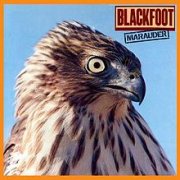 |
Marauder (1981, 37.15) ****/TGood MorningPayin' for it Diary of a Workingman Too Hard to Handle Fly Away Dry County Fire of the Dragon Rattlesnake Rock'n'Roller Searchin' |
Current availability:
Mellotron used:
To say that Southern legends Blackfoot have had a chequered career would be to ever-so-slightly understate the matter. Forming in 1969, as Fresh Garbage, they split and reformed several times (once for founder member Rick(ey) Medlocke to drum for Lynyrd Skynyrd) before releasing two relatively obscure albums in the mid-'70s. After another hiatus, they released their most successful album, 1979's Strikes, quickly following up with Tomcattin' and '81's Marauder. Marauder defines the band's 'heavy Skynyrd' sound, containing classics along the lines of beat-you-into-submission opener Good Morning, the storming Too Hard To Handle, the more commercial Dry County and epic closer Searchin'.
Another classic is one of the album's two ballads, Diary Of A Workingman. Despite having known the song since the album's release, it was only on a recent replay that I spotted Pat McCaffrey's Mellotron cellos and high-end flutes on the track, subsequently verified by somebody rather more expert in these matters than myself. Sadly, Marauder was to mark the beginning of the end for the band, as they slowly drifted into irrelevance via multiple lineup changes and crummy, commercial hard rock releases. Medlocke joined Skynyrd for good in the mid-'90s, leaving various ex-members to scrape some kind of living from the band's legacy, until, in a move of quite astounding shoddiness, he reclaimed the name by sending out a group of young musicians as Blackfoot, none of whom have the slightest connection with the original band. Franchise rock.
See: Lynyrd Skynyrd
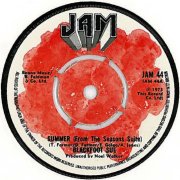 |
7" (1973) ***½/T Summer Morning Light |
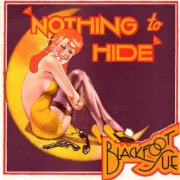 |
Nothing to Hide (1973, 36.05/53.32) ***½/0 (½) |
|
| Messiah Country Home Cry My Oh My Now We're Three The Spring of '69 Glittery Obituary On His Own |
Too Soon Gypsy Jam [CD adds: Standing in the Road Celestial Plain Sing Don't Speak 2 B Free Summer] |
|
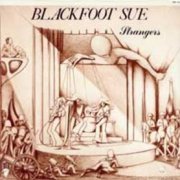 |
Strangers (1977, recorded 1974, 37.34) ***/T½Care to BelieveTouch the Sky Shoot All Strangers Tobago Rose Nostalgia Ain't (What it Used to Be) Bye Bye Birmingham Join Together 1812 |
Current availability:
Mellotrons used:
Blackfoot Sue are remembered today, if at all, for their one-off UK hit, Standing In The Road, a 1972 no. 4. Helmed by twins Tom and David Farmer, their 'classic' lineup included guitarists Eddie Golga and Alan Jones, all but Jones doubling on keyboards when required. Their official site mentions that they bought a Mellotron, but never took it on the road, in which case, why bother? Why not just hire one when you need it? Odd. Anyway, their third (non-album) single, Summer, is an atypically gentle number, sometimes referred to as being part of the 'Seasons Suite', although I can't trace any references to the longer work. It features a few Mellotron flute pitchbends for good measure, although it's some way off 'Mellotron classic' status.
They released their only album to appear during their 'lifespan', Nothing to Hide, in 1973, bullishly containing no singles, while featuring a vicious put-down of the then-current glam scene, Glittery Obituary. The album's peak, though, is the ripping The Spring Of '69, a condensed heavy epic on a par with the genre's market leaders. Although there's no Mellotron on the original record, it's the easiest place to find the aforementioned Summer, one of no fewer than five bonus tracks on Repertoire's mid-'90s CD issue, although, oddly, the track's (Mellotron-free) b-side, the rather average Morning Light, has been added to their follow-up.
This unluckiest of band's said follow-up, Strangers, was recorded in 1974, but not released until '77 and then only in the States, just as the band were splitting up. The bulk of it comprises workaday hard rock-lite, until halfway through side two, when they suddenly lurch into an eleven-minute instrumental prog epic, 1812 (apparently a live fave), complete with musical quotes from Tchaikovsky's piece, church bells, cannon fire and a studio trickery-assisted lengthy Mellotron choir chord at the end. It's not the only Mellotron on the album; Joining Together, while not a great song, features a full-on strings part, although it does little to improve the track. As on Summer, no-one's credited, so it could be either of the Farmers or Golga.
Blackfoot Sue were, at heart, a hard rock band who never really gained enough audience credibility to break through commercially, despite some fine album tracks. As their site says, in the early '70s you were either a 'serious' album artist, or you had hits. They had a hit, cogito ergo sum. Or something. Although their first album's noticeably better than their second, it doesn't contain 1812, so if you really want to hear this lot properly, you're going to need both, as 1812 doesn't appear on any compilation (although, sensibly, The Spring Of '69 does). Incidentally, the band later morphed into Liner, a cheeso late-'70s mainstream band whose one, eponymous album is a classic 'record company record', i.e. the label loved it, but nobody bought it. Forget that, remember them this way.
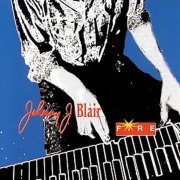 |
Fire (2000, 52.59) ***/T |
|
| Dancin' By the River (urban bbq mix) People Medley Fire All Things Are Possible One Wonderful Smile Love, Love Alone A Little Industrial Nachtmusik Lighten Up |
Dancin' By the River (tex-mex Garage Band Mix) Throw the First Stone Man of Sorrows |
|
Current availability:
Mellotron used:
I'm really not sure how to describe San Franciscan Johnny J. Blair's Fire: singer-songwriter funk? He deftly combines the lyricism of the former with the dancefloor-filling capabilities of the latter, but is the world ready for this mash-up? Apparently so, as it's his best-selling album, so what do I know? Best tracks? Monster synthfest A Little Industrial Nachtmusik (ho ho) and the Tex-Mex Garage Band Mix of Dancin' By The River, but only because they're the least funky things here, he said, whitely.
Blair's credited with Mellotron; while many of the sounds here could be it, the only definite is the mad, high-speed flute solo on A Little Industrial Nachtmusik that surely (surely?) has to emanate from a real machine. I was under the impression that the following year's Exotic Animals & Beaches of Pennsylvania also featured Blair on Mellotron, but it seems not.
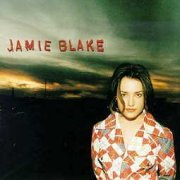 |
Jamie Blake (1997, 39.06) **½/½ |
|
| Coming Down Runaway Whisper Too Loud So Precious Yell What You Say You Asked Me Dragstrip Girl |
When We're Dumb Things I Could Have Said The Worst is Over |
|
Current availability:
Mellotron used:
Despite Jamie Blake's eponymous 1997 debut slotting neatly into the 'mainstream pop/rock' bracket, she's had trouble sustaining a solo career; as a result, she currently plays in The Rentals, alongside an ex-member of Weezer. Jamie Blake is the kind of album that's raided by TV execs looking for background music for feelgood TV show and films, in this case, Gossip Girl (TV) and Darkness Falls (film), which probably gives you a good idea of how it sounds. Best tracks? Not really, no, although a couple of the more energetic efforts (So Precious, What You Say, You Asked Me) are relatively palatable.
Jamie's credited with Mellotron, so I suppose we have to assume that the exceedingly background flutes (and strings?) on When We're Dumb are just that, although the cellos on Dragstrip Girl are more likely to be generic samples. Sean Slade (Dinosaur Jr.) co-produces, so who knows? It might even be real. While I've heard an awful lot worse than Jamie Blake, I've also heard a hell of a lot better, so if I were you, I probably wouldn't bother.
 |
Le Long des Lignes (2005, 43.57) ***½/TT½ |
|
| Les Aléas Tout se Dévoile Le Long des Lignes Si c'est Ici Se Perdre Je Respire Les Cimes Celui que tu Cherches |
Blâme Moi La Panne C'est là |
|
Current availability:
Mellotron used:
Blanc seem to be a French indie outfit, although I know little about their history. Le Long des Lignes is an interesting effort, although I found some of it dragged a little, if not enough to really spoil the album. Several excellent tracks, though, including La Panne and the epic Je Respire, which has a wonderful cinematic feel to it. They recorded the album in Paris, then presumably sent the tapes (does anyone record on tape any more?) to Mattias "Änglagård" Olsson's Roth Händle studio in Stockholm for overdubs. As you do.
Doubtless amongst other things, Mattias added Mellotron to several tracks, with flutes on Les Aléas and various combinations of cellos and strings on the other highlighted tracks. Strangely, nothing on Je Respire, but most of his Mellotron work is typically upfront, with particularly fine strings on Celui Que Tu Cherches. It's perfectly possible that there's more Mellotron on there, considering some of the more unusual sounds in the Olsson collection, but this is all I can actually hear. So; good album, though not one for the progheads out there, with some nice Mellotron work from the ever-reliable Mattias.
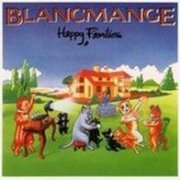 |
Happy Families (1982, 40.32) ***½/½ |
|
| I Can't Explain Feel Me I've Seen the Word Wasted Living on the Ceiling Waves Kind Sad Day |
Cruel God's Kitchen |
|
Current availability:
Mellotron used:
I have to admit to having a bit of a soft spot for the more inventive end of the early-'80s synth-pop scene; Soft Cell, OMD, even Blancmange. Remember Blancmange? Their biggest hit was the frankly bonkers Living On The Ceiling, which you probably know, even if you think you don't. They took a while to get themselves signed, missing the main synth-pop boat in the process. Their first release was an independent EP in 1979, Irene & Mavis, but it took them three years to sign to London and get anything else out, and then it wasn't until their third single that they actually started selling records in significant numbers. Their unique sound was a combination of vocalist/guitarist Neil Arthur's declamatory tones and Stephen Luscombe's exemplary synth work, initially still in analogue times.
Their debut album, Happy Families, featured a sleeve painting in the style of Louis Wain, whose anthropomorphic cats are another thing you'll know even if you think you don't. I mean, compare this to Spandau Ballet... The best synth-pop of the era can be seen as a kind of successor to art-rock and tends to be beautifully crafted, as against, say, Spandau Ballet... Living On The Ceiling fits this description perfectly and is merely the best example of their style on the album, with its bizarre chorus and iconic Coral Sitar line. If you really haven't heard them, imagine Kraftwerk filtered through a (new) romantic haze, with Bryan Ferry's evil twin on vocals, or a less arty Japan. Unlike, say, Spandau Ballet, the album even features a beautiful instrumental, Sad Day, which sounds unbelievably familiar, although from where I have no idea.
So what's this doing here, eh? Obvious answer, but howcum I found out? Stephen Luscombe (1954-2025) wrote to me a while back to let me know, so I felt the least I could do was pick up a copy of the album the next time I saw it going cheap. One Mellotron track only, in that wasteland decade for the instrument, with some almost unrecognisable heavily-effected choirs on the album's first single, God's Kitchen, which just goes to show what a futile undertaking this site can be sometimes.